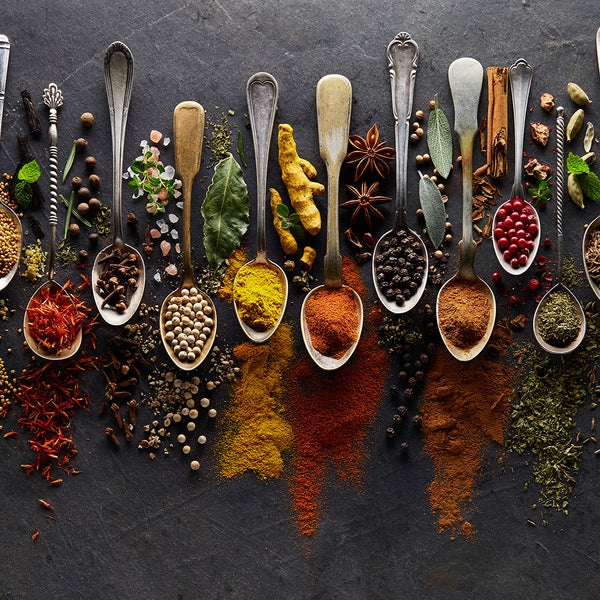
Best Herbs to Take With Probiotics
Health problems such as gut microbiome imbalance, also known as dysbiosis, and small intestinal bacteria overgrowth (SIBO) are linked to gastrointestinal issues that include: abdominal cramping, bloating, belching, excess gas, constipation, or diarrhea [1]. Certain herbs such as ginger, turmeric, and cinnamon are good sources of phytochemicals (active components in plants) that help minimize digestive discomfort [3-4]. In addition, many botanical extracts target dysbiosis by disrupting invader activity in the gut [5-7].
Clinical research shows that increasing the intake of probiotics helps combat microbiome imbalance [8, 9]. Studies also show that probiotics work synergistically with herbs to enhance health benefits, including [8-10]:
- Heightened antioxidant activity
- Bolstered immune responses
- Reinforced probiotic activity
- Balanced levels of inflammation in the gut
This means that people who consume herbs regularly can benefit from added digestive support in the form of concentrated prebiotic and probiotic supplements. Syntol and Floraphage are scientifically developed dietary supplements designed to minimize issues related to SIBO and dysbiosis.
Herbs Enhance the Gastrointestinal Environment
Furthermore, several herbs contain probiotics that support healthy immune responses and a balanced microbiome [10]. Some herbs such as triphala, which has been described as one of the best herbs for issues related to a leaky gut, also act as a prebiotic for gut microbiome [11]. Therefore, these herbs help lessen digestive issues through various pathways.
The addition of common herbs such as ginger, turmeric, cinnamon, and triphala with powerful supplements offers unmatched health benefits. Syntol and Floraphage are designed to complement a diet that is rich in botanical nutrients.
Syntol Offers Microbiome Support
Syntol is a prebiotic+probiotic formulation with digestive enzymes that encourage a healthy intestinal environment to promote microbiome balance. The unrivaled formula contains 13.6 billion colony- forming units (CFUs) of probiotic bacteria—several of which are known to withstand the acidic conditions in the gut. This allows probiotics to thrive and outnumber harmful microorganisms in the gastrointestinal tract, a process that helps disrupt invader overgrowth [12, 13]. Certain forms of probiotics in Syntol also release hydrogen peroxide, which destroys biofilms and aids the body’s natural ability to clear waste [12, 14].
In addition, the digestive enzymes in Syntol help degrade biofilms and the inner material of foreign invaders [15, 16]. The blend of digestive enzymes, probiotics, and prebiotic nourishment for good bacteria reinforces microbiome balance, which helps minimize persistent digestive problems, including SIBO.
Floraphage Provides Added Prebiotic Nourishment

Floraphage is an exclusive blend of prebiotic multipliers that break down harmful invaders into waste that becomes prebiotic nutrients for probiotics to consume. The prebiotic multipliers (phages) in Floraphage destroy the biofilms of destructive microorganisms in the same manner as the probiotics and digestive enzymes in Syntol [17]. This type of phage activity promotes the removal of invaders and frees space for beneficial organisms to flourish in the gut. The phages also enhance immune responses by boosting the body’s production of antibodies [18]. These properties make the addition of these two supplements to a plant-rich diet essential for gastrointestinal rejuvenation.
Consuming herbs regularly boosts digestive function, immune system activity, and healthy inflammatory responses [4, 5, 10, 11]. Adding Syntol and Floraphage to the daily diet also helps the body maintain intestinal balance and digestive comfort. Support optimal health today with science-based nutritional supplements.
References
- Jacobs C, Coss Adame E, Attaluri A, Valestin J, Rao SS. Dysmotility and proton pump inhibitor use are independent risk factors for small intestinal bacterial and/or fungal overgrowth. Aliment Pharmacol Ther. 2013;37(11):1103-11.
- Hu ML, et al. Effect of ginger on gastric motility and symptoms of functional dyspepsia. World J Gastroenterol. 2011;17:105-10.
-
Ng QX, et al. A meta-analysis of the clinical use of curcumin for irritable bowel syndrome (IBS).
J Clin Med. 2018;7(10). pii: E298. - Fifi A., et al. Herbs and spices in the treatment of functional gastrointestinal disorders: A review of clinical trials. Nutrients. 2018;10(11): 1715.
- Prakasita VC, et al. Combinations of herbs and probiotics as an alternative growth promoter: An in vitro study. Vet World. 2019;12(4):614-20.
- Liu Q, et al. Antibacterial and antifungal activities of spices. Int J Mol Sci. 2017;18(6):1283.
- Ankri S, Mirelman D. Antimicrobial properties of allicin from garlic. Microbes Infect. 1999;1(2):125-9.
- Eskesen D, et al. Effect of the probiotic strain Bifidobacterium animalis subsp. lactis, BB-12®, on defecation frequency in healthy subjects with low defecation frequency and abdominal discomfort: a randomised, double-blind, placebo-controlled, parallel-group trial. Br J Nutr. 2015;114(10):1638-46.
- Ortiz-Lucas M, Tobias A, Saz P, Sebastian JJ. Effect of probiotic species on irritable bowel syndrome symptoms: A bring up to date meta-analysis. Rev Esp Enferm Dig. 2013, 105(1):19-36.
- Montenegro D, et al. Uncovering potential 'herbal probiotics' in Juzen-taiho-to through the study of associated bacterial populations. Bioorg Med Chem Lett. 2015;25(3):466-9.
- Peterson CT, et al. Prebiotic potential of herbal medicines used in digestive health and disease.
J Altern Complement Med. 2018;24(7):656-65. - Alvarez-Olmos MI, Oberhelman RA. Probiotic agents and infectious diseases: a modern perspective on a traditional therapy. Clin Infect Dis. 2001;32(11):1567-76.
- Kabak B, Brandon EF, Var I, Blokland M, Sips AJ. Effects of probiotic bacteria on the bioaccessibility of aflatoxin B(1) and ochratoxin A using an in vitro digestion model under fed conditions. J Environ Sci Health B. 2009; 44(5):472-80.
- Anukam K, et al. Augmentation of antimicrobial metronidazole therapy of bacterial vaginosis with oral probiotic Lactobacillus rhamnosus GR-1 and Lactobacillus reuteri RC-14: randomized, double-blind, placebo-controlled trial. Microbes Infect. 2006;8(6):1450-4.
- Isenman L, et al. The endocrine secretion of mammalian digestive enzymes by exocrine glands. Am J Physiol. 1999;276(2 Pt 1):E223-32.
- Kolac C, et al. Oral bioavailability of proteolytic enzymes. Eur J Pharm Biopharm. 1996; 42(4): 222-32.
- Merril CR, et al. Long circulating bacteriophage as antibacterial agents. Proc Natl Acad Sci. 1996;93(8):3188-92.
- Górski A, Miedzybrodzki R, Borysowski J, et al. Bacteriophage therapy for the treatment of infections. Curr Opin Investig Drugs. 2009;10(8):766-74.